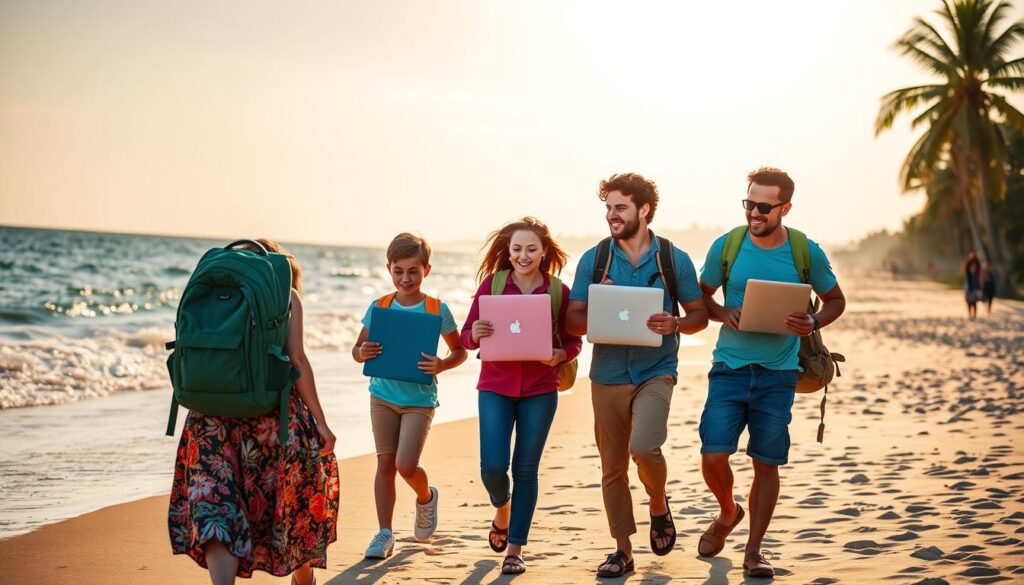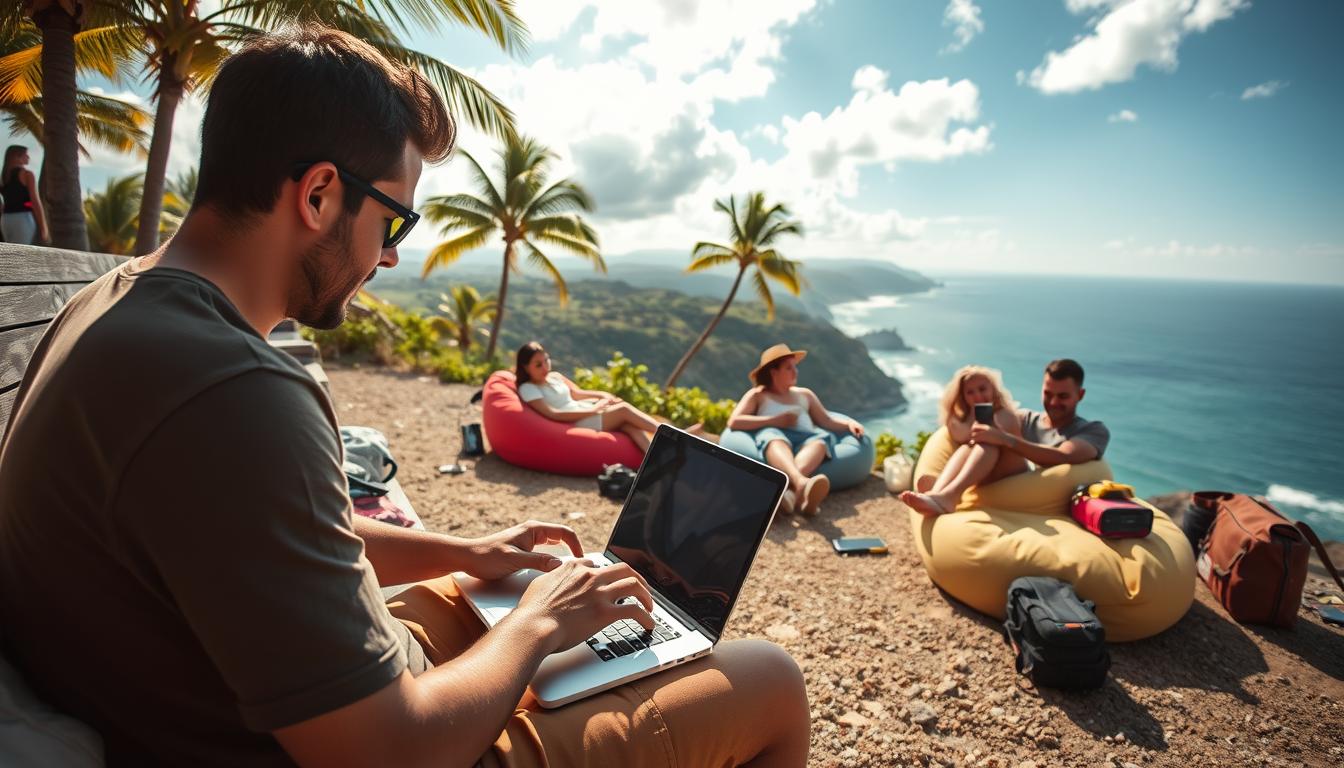Digital Nomad Life: For Families or Solo Travelers?
Imagine leaving behind the usual 9-to-5 job for amazing views around the world. Is the digital nomad lifestyle good for families or solo travelers? This new way of living changes how we work, travel, and find happiness.
Digital nomadism is more than just a cool trend. It’s a big change in how we see work and life. Now, about 24% of American digital nomads travel with their kids. This shows that many people want freedom and adventure in their lives.
Whether you’re traveling alone or with your family, learning about digital nomadism can open up new doors. Every journey is different, filled with amazing moments and tough times.
Key Takeaways
- Digital nomadism offers unprecedented work flexibility
- Families and solo travelers can successfully adopt this lifestyle
- Careful planning is key for long-term success
- Financial preparation is vital for sustainable travel
- Cultural adaptability shapes the nomadic experience
Understanding the Digital Nomad Lifestyle
Digital nomadism is a new way to work and live. It mixes being free to work from anywhere with the chance to explore the world. This lifestyle lets people avoid the usual office routine and enjoy flexibility and travel.
The digital nomad movement has changed how we see work and travel. People from many fields are using technology to have more freedom in their careers. They can work from anywhere, which is a big change.
What Defines a Digital Nomad
- Ability to work from anywhere with reliable internet
- Flexible career in digital-friendly fields like:
- Software development
- Digital marketing
- Online teaching
- Graphic design
- Commitment to location independence
- Willingness to adapt to different cultural environments
The Growing Trend of Location Independence
More people want to work from anywhere, not just in an office. About 30% of digital nomads now include families. This shows how appealing this lifestyle is to many.
| Digital Nomad Lifestyle Aspects | Key Characteristics |
|---|---|
| Income Potentia | Can exceed traditional office earnings |
| Geographic Flexibility | Work from multiple countries |
| Cost of Living | Lower expenses in select destinations |
Common Misconceptions About Digital Nomadism
Many think digital nomadism is always a vacation. But it’s not. It needs discipline, planning, and hard work. Nomads face challenges like finding good internet and feeling lonely.
Digital nomadism is not about escaping work, but reimagining how and where work happens.
Knowing the real deal about digital nomadism helps people decide if it’s right for them. It’s about choosing a career that lets you work from anywhere and travel.
Is the digital nomad lifestyle suitable for families or solo travelers?
The digital nomad lifestyle offers unique chances for both families and solo travelers. It’s all about what you need and how you like to live. Your success depends on your situation, what you prefer, and how well you can adjust.
For families, the digital nomad lifestyle has its pluses. About 17.5% of digital nomads travel with their families now. This shows a growing interest. Families can save money, get a different kind of education, and spend quality time together.
- Significant cost savings by avoiding traditional homeownership expenses
- Flexible learning opportunities through roadschooling
- Enhanced family bonding and unique life experiences
Solo travelers, on the other hand, have their own perks. They can travel whenever they want and easily move to new places.
| Aspect | Families | Solo Travelers |
|---|---|---|
| Travel Flexibility | Moderate (3-month average stays) | High (frequent location changes) |
| Education | Roadschooling with online resources | Self-directed learning |
| Budget Considerations | Higher expenses, more planning | Lower individual costs |
The world has changed a lot after COVID-19. More people see the value in remote work and flexible living. Whether you’re a family or solo, being ready, flexible, and open to new things is key.
Remember, the digital nomad lifestyle isn’t one-size-fits-all. Your success depends on careful planning, financial stability, and a passion for exploring the world.
The Solo Digital Nomad Experience
Starting a solo digital nomad journey is a mix of remote work and exploring new places. It lets you create a life that grows your career and offers amazing travel experiences.
Digital nomads like Ellie Green show how solo travel can change your life. She traveled to nine countries in four years, showing the beauty of living without a fixed location.
Benefits of Solo Travel and Remote Work
- Increased personal growth and self-discovery
- Complete control over work and travel schedules
- Opportunity to explore diverse cultures
- Enhanced professional adaptability
Challenges Faced by Solo Digital Nomads
Though exciting, solo travel has its own challenges. Loneliness and social isolation are big issues, with 40% of digital nomads feeling disconnected.
Building Community While Traveling Alone
To fight loneliness, solo travelers use different strategies. Ellie suggests:
- Staying in social hostels
- Joining digital nomad meetups
- Utilizing online community platforms
- Participating in co-working spaces
The digital nomad lifestyle is very flexible, with 80% of nomads saying they work better in new places. By choosing the right places to work and travel, you can make your solo journey rewarding.
Family Digital Nomad Life Dynamics

Family travel has changed a lot with digital nomadism. Now, families can work and travel together. This lifestyle brings unique challenges and benefits for those who are open to new experiences.
Digital nomad families have to think differently about their lifestyle:
- Maintaining educational continuity for children
- Managing remote work responsibilities
- Creating stable family relationships
- Developing adaptability skills
Traveling with kids needs careful planning and flexibility. Structured routines are key in a changing world. Many families use online learning and world schooling to keep up with education while exploring new places.
“Our family discovered that the world is the best classroom,” says Sarah Martinez, a long-term digital nomad parent.
Keeping finances stable is also important for digital nomad families. They need to manage their money well and keep travel costs down. Here’s some data on their financial situation:
| Aspect | Average Cost |
|---|---|
| Monthly Family Expenses | $3,500 – $5,000 |
| Education Costs | $500 – $1,500 |
| Healthcare | $300 – $800 |
By using technology, creativity, and teamwork, digital nomads are changing how we work, learn, and grow together.
Financial Considerations for Different Nomad Types
Digital nomadism needs smart financial planning, which changes a lot for solo travelers and families. It’s key to understand the cost of living to keep remote work and digital nomadism going well.
As a digital nomad, you must plan your finances carefully and find ways to make money. Your strategy will change if you’re traveling alone or with a family.
Solo Traveler Budget Planning
Solo digital nomads have special financial benefits that help them enjoy their travels more:
- Use geo-arbitrage to find places that cost less
- Save money by living in flexible ways
- Make money from different freelance jobs
Family Cost Management Strategies
Families going digital nomad face more financial challenges:
- Plan for extra costs like education and healthcare
- Find stable remote jobs
- Build big emergency funds
| Expense Category | Solo Traveler | Family |
|---|---|---|
| Monthly Accommodation | $800-$1,500 | $1,500-$3,000 |
| Healthcare | $50-$150 | $300-$800 |
| Education | N/A | $500-$1,500 |
Income Generation Methods
Good digital nomads make money in many ways:
- Use freelance sites like Upwork and Fiverr
- Work full-time remotely
- Start online businesses for passive income
- Offer consulting and special services
Pro tip: Always keep an emergency fund for 3-6 months of expenses. This keeps your finances stable on your digital nomad journey.
Education and Work-Life Balance

Digital nomad families face unique challenges balancing education and work. The traditional classroom model doesn’t fit their lifestyle. This pushes parents to find new ways to educate their kids.
Online schooling is a powerful solution for these families. It offers many benefits:
- Personalized learning pace
- Consistent educational routine
- Global connectivity
- Adaptable curriculum
Work-life balance is key for digital nomad families. Parents must manage work and ensure their kids get a good education.
| Educational Option | Pros | Challenges |
|---|---|---|
| Online Schooling | Flexible schedule | Internet dependency |
| Homeschooling | Customized learning | Requires parent involvement |
| International Schools | Structured environment | Higher costs |
Traveling with children can be an enriching experience. Kids learn to adapt, become culturally aware, and independent.
Successful digital nomad families suggest a few things. They recommend setting routines, using online resources, and focusing on both education and family time.
Location Selection Strategies
Choosing the right destination is key for location independence. Whether solo or traveling with family, the right spot can make your digital nomad journey great.
When picking the perfect spot, you must weigh many factors. These impact your work and lifestyle as a digital nomad. You need to find a place that’s both good for work and living.
Best Destinations for Families
Family digital nomads look for certain things in a location. They need:
- Quality international schools
- Safe neighborhoods
- Family-friendly healthcare systems
- Affordable living costs
Some top spots for families include:
- Portugal (D8 visa requires €4,096 monthly income for families)
- Costa Rica (30% lower cost of living compared to US)
- Mexico (comfortable living on $2,000 monthly)
Popular Solo Nomad Hubs
Solo travelers look for places with great communities and networking. The best spots have strong digital setups and fun social scenes:
- Bali, Indonesia
- Chiang Mai, Thailand
- Lisbon, Portugal
- Medellin, Colombia
Considerations for Both Groups
Both solo and family travelers should think about:
- Internet reliability (minimum 50 Mbps recommended)
- Visa requirements and costs
- Healthcare accessibility
- Cultural experiences
- Cost of living
With 40 regions now welcoming digital nomads, your ideal spot is out there. Do your homework and pick a place that fits your goals.
Health and Safety Considerations
Being a digital nomad means you need to plan for health and safety. This is true whether you’re traveling with family or alone. Knowing your healthcare options is key.
Getting health insurance is a big step for digital nomads. There are many providers for those who work from anywhere:
- SafetyWing offers maximum coverage of $1.5 million USD with a 35% discount for Nomads Embassy members
- Genki Native provides health insurance starting at €105 monthly
- Insured Nomads health insurance begins at $224 per month for individuals
Mental health is also important for digital nomads. The lifestyle can be tough, with challenges like:
- Potential isolation and loneliness
- Blurred work-life boundaries
- Increased stress from constant travel
To stay mentally well, digital nomads should:
- Use online therapy services
- Practice mindfulness
- Join supportive online communities
It’s also vital to stay safe. Research the places you visit, choose secure places to stay, and keep in touch with family. Many digital nomad visas need you to have at least $50,000 in medical coverage.
Pro tip: Always have emergency contact information and backup healthcare documents ready when you travel.
Conclusion
Exploring if the digital nomad lifestyle works for families or solo travelers shows a complex path. Success depends on careful planning, being adaptable, and facing new challenges. With 50% of digital nomads seeing lower living costs, the financial gains can be big for those ready to take the leap.
Digital nomadism isn’t for everyone. Solo travelers and families face different hurdles, like feeling lonely and dealing with visa rules. You’ll need to be resilient, with 80% of successful digital nomads using online communities for support before they arrive.
The secret to doing well in this lifestyle is being flexible and having realistic hopes. Budget extra – add 20% to your expected costs for surprises. While there are challenges, like different healthcare and income changes, the benefits of seeing the world and growing personally are huge for those who prepare well and stay open-minded.
Your digital nomad journey will be unique, just like you. Whether you’re traveling alone or with family, success comes from knowing your goals, being adaptable, and embracing the chance to change your work and life on a global scale.
FAQ
What exactly is a digital nomad?
A digital nomad works remotely and travels a lot. They use the internet to do their jobs from anywhere. This lifestyle lets them explore new places while keeping their career going.
Is the digital nomad lifestyle suitable for families with children?
Yes, families can do well as digital nomads with some planning. They get to learn new things and spend time together. But, they need to figure out education and find places that are good for families.
How do digital nomads support themselves financially?
They make money in many ways, like freelancing or running online businesses. The key is to have a job that you can do from anywhere. Many digital nomads have more than one way to make money.
What are the biggest challenges of being a digital nomad?
The big challenges are keeping a regular work schedule and dealing with bad internet. Time zones, feeling lonely, and finding healthcare can also be tough. Families and solo travelers face different problems, but both need to be flexible and plan well.
How expensive is the digital nomad lifestyle?
It depends on where you go and how you live. Some people spend $1,000 a month, while others spend more. Families usually spend more because of things like school and healthcare. It’s important to budget well and choose places that are affordable.
What are the best destinations for digital nomads?
Great places include Thailand, Bali, Portugal, and Mexico. These places are cheap, have good internet, and lots of other digital nomads. For families, look for places with good schools and safety.
How do digital nomads handle healthcare and insurance?
They often get international health insurance. This covers them in many countries. It’s also good to have travel insurance with medical help. You should research healthcare options and have a plan for emergencies.
Can children get a good education while traveling?
Yes, kids can learn a lot while traveling. Families can homeschool online or send them to international schools. The key is to make sure they get a good education and learn from their travels.
What skills are most valuable for digital nomads?
Important skills include being tech-savvy, adaptable, and able to work well alone. Knowing how to program or market online is also helpful. Being able to solve problems and work independently is key to success.
How do digital nomads maintain social connections?
They meet people through co-working spaces and online groups. Solo travelers might find it easier, but families can connect through schools and expat groups. Staying in touch with friends and family back home is also important.

